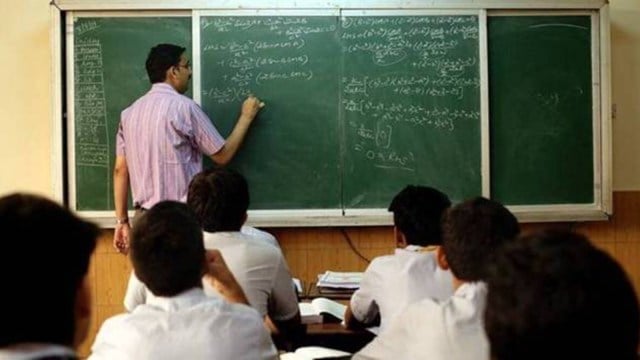Maharashtra curriculum draft proposes using Gita, Manache Shlok for improving memorisation of students
Many educationists have questioned the decision to the Manusmriti reference.
 Teachers expressed that while having these references as supplementary material is beneficial, there should not be insistence on integrating them into regular teaching methods. (Representational Image)
Teachers expressed that while having these references as supplementary material is beneficial, there should not be insistence on integrating them into regular teaching methods. (Representational Image)The newly proposed Maharashtra State Curriculum Framework (SCF), which advocates inclusion of Indian Knowledge System (IKS) in School Education (SE) and suggests incorporating texts such as the Bhagavad Gita and Manache Shlok — a text composed by Samarth Ramdas Swami, for effective memorisation through recitation competitions for students, has drawn flak from the education sector.
The chapter on “value education and disposition” from the SCF, which focuses on character-building for schoolchildren, begins with a Sanskrit verse on respecting elders taken from Manusmriti, an ancient Hindu legal text describing the social system. However, this choice has sparked a debate regarding the intention behind referencing Manusmriti in the draft.
The Maharashtra State Council for Educational Research and Training (SCERT) released a draft SC-SE on its official website, inviting feedback from stakeholders before finalising the document.
Many educationists have questioned the decision to the Manusmriti reference. “There are numerous Sanskrit verses conveying similar meanings, yet the draft selects one from Manusmriti. This decision appears either politically naive or intentionally provocative, potentially offending certain segments of society,” said a renowned educationist.
While the proposed subject combination scheme under the SCF recommends incorporating one course from IKS starting from Class 6, the draft also suggests integrating IKS across all classes, emphasising on instilling Indian values.
According to educationist Vasant Kalpande, “India-centric knowledge should not exclude awareness of the Indian Constitution and global trends, essential for the growth of the next generation.”
According to examples provided in the draft, the learning of trigonometry could include the contributions of Bhaskaracharya, understanding medical science innovations from ancient India by Sushrut or Charak, the importance of Yoga, knowledge about ancient technology in India, and insights into Vedic practices when introducing modern astronomy. Additionally, the draft suggests understanding the ancient practice of “Guru-Shishya” (teacher-disciple) relationships to improve student-teacher dynamics.
Teachers expressed that while having these references as supplementary material is beneficial, there should not be insistence on integrating them into regular teaching methods.
Criticising the draft, educationist Kishore Darak from Ahmednagar said, “The focus seems to be on presenting upper-caste Hinduism as Indian, leading to saffronisation and Brahmanisation of education.”
Educators also highlighted that the document lacks inclusivity, especially in a state like Maharashtra with significant migration, resulting in a diverse demographic. Darak said, “The SCF fails to consider all children attending schools in the state, who hail from various socio-economic and cultural backgrounds.”
The document’s availability only in Marathi has also sparked criticism, with teachers from non-Marathi medium schools questioning its relevance to their teaching practices. A teacher said, “It’s a state-level curriculum framework, but Maharashtra State Board administers exams in eight mediums.”
Another teacher said, “The draft appears to cater exclusively to Marathi schools, neglecting the diverse student population in state-run schools.”
Even Marathi schools have expressed reservations about the draft. Sushil Shejule, coordinator of the Marathi School Managements’ Association, said, “India’s rich ancient culture should not be a pretext for enforcing religious education in schools accommodating children from diverse religious backgrounds.”
Shejule announced that the association will organise a group discussion on the topic to formulate a collective response to the SCERT.







